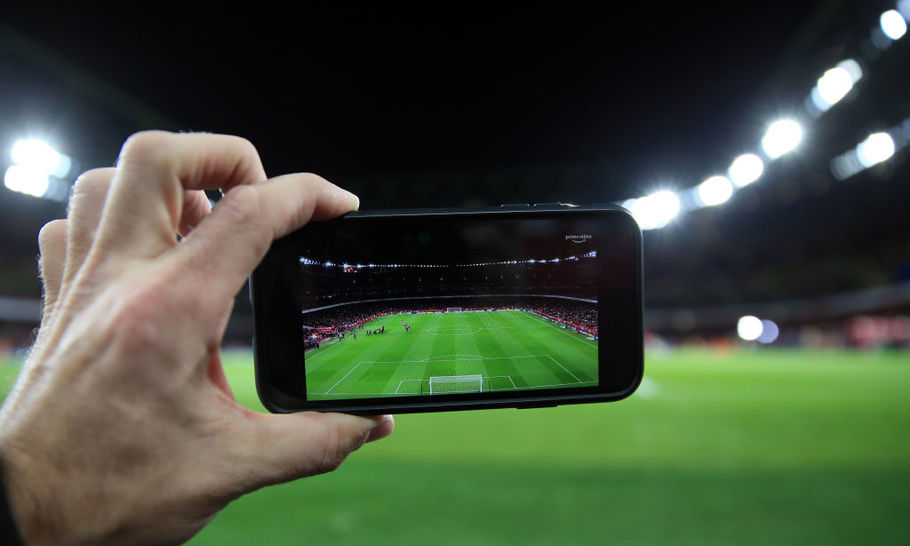Amazon’s Premier League debut shows we need to update sports broadcasting

Amazon Prime live Premier League match via the internet December, 2019. (Photo by Marc Atkins/Getty Images)
It was emotional, deeply tribal, hard fought, and culminated in a big-name sacking.
I don’t mean the wall-to-wall election coverage we’re currently enduring, but the mid-week round of Premier League matches. Unlike the election campaign, this broke new ground (and not just because Arsenal slumped to the club’s worst run of results in more than 40 years). Amazon Prime Video streamed all 10 matches over three nights, the first time anything like this has been tried in the UK.
Make no mistake — this was a major step forward for sports broadcasting in this country. In Britain, the broadcast of live football on TV is still tied up in arcane rules. Only a limited number of games can be broadcast live in pre-determined slots, an absurd degree of constraint in our 21st-century media environment. To get round this, people illegally stream games that are not being shown in the UK but are legitimately available elsewhere.
iTunes and Netflix, among others, have taught us that, if you make quality content available at a fair price, people prefer to get it legally. The Premier League does not seem to have grasped this concept.
The argument behind this rationing of televised football is that it encourages people to attend matches. But no dedicated fan would decide not to go to a game just because it’s being shown on the telly. It is a totally different experience, and people decide which one they prefer or can afford.
There may be an impact on lower-league teams, with fans not going to support their local side. But given how easy it is illegally to stream the games currently not shown on TV, that argument seems weak.
A subscription-style model, where fans of one particular sport can watch as much of it as they want, works very well in the US. The NFL, Major League Baseball, basketball and others all offer a season-long pass to watch pretty much any game (there are sometimes in-state market restrictions). It seems farcical that we can’t do this for Premier League football and other sports here in the UK.
Indeed, the FA has already acknowledged that such a model can work. Women’s football fans can stream every game in the Women’s Super League (WSL) via The FA Player. For free. Football’s governing body clearly understands that making it accessible to more people benefits the sport as whole.
Of course, the Premier League is currently a more valuable commodity than the WSL. It is a stand-alone body too, separate from the FA, and so it is concerned with 20 teams and not the game as whole. It would be impossible to give away televised coverage for free, but surely the Premier League can see the long-term benefits of widening access to the game?
If it does not, there is a risk that the clubs, many of which already have their own television channels, will try and break out and sell their own television rights. Just on Friday, Manchester United announced a major deal with Alibaba that gives the Chinese retail giant the right to stream the club’s matches.
Fans seem to like the choice that streaming offers. While Amazon has declined to make the viewing figures public, Alex Green, the managing director of Prime Video Sport Europe, said that “millions of football fans” had tuned in, Amazon Prime had record UK signup days on both Tuesday and Wednesday.
That is not to say everything was perfect. There was some lag and delay, as there always is when streaming live sport. The game could be a minute or so ahead on one device as compared to another, which is a problem, especially if people are getting updates and push notifications elsewhere.
The viewing experience is dependent on the capacity of an individual users’ connection. Mine dropped out at one point, even though I have very fast internet. By the time it returned, I’d missed a major event in the game: a crucial sending-off.
Amazon and other streaming providers will have to overcome these issues but, by and large, the technology held up this week. There were innovative new features too, like the ability to turn off commentary and listen only to the stadium noise.
This experiment has been a success. It should trigger a major re-think about how we broadcast big-time sport in the UK.





